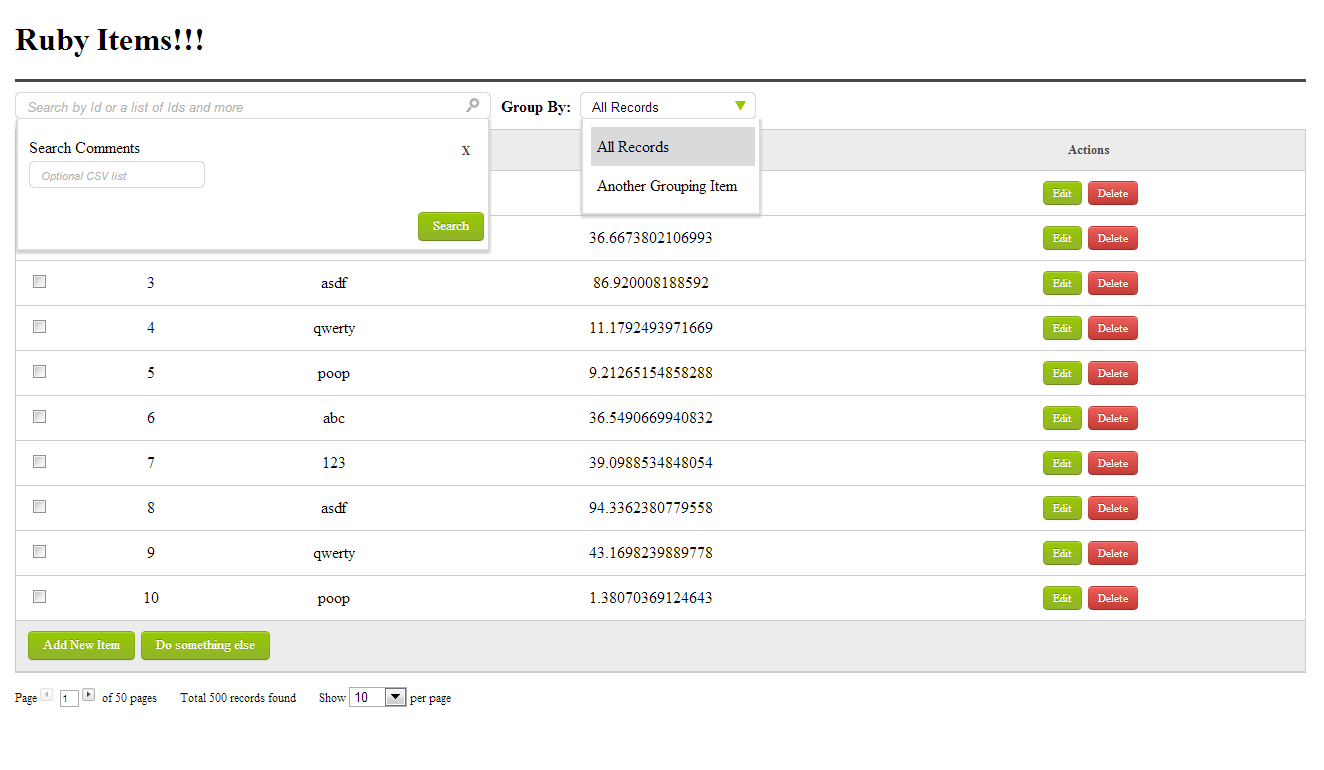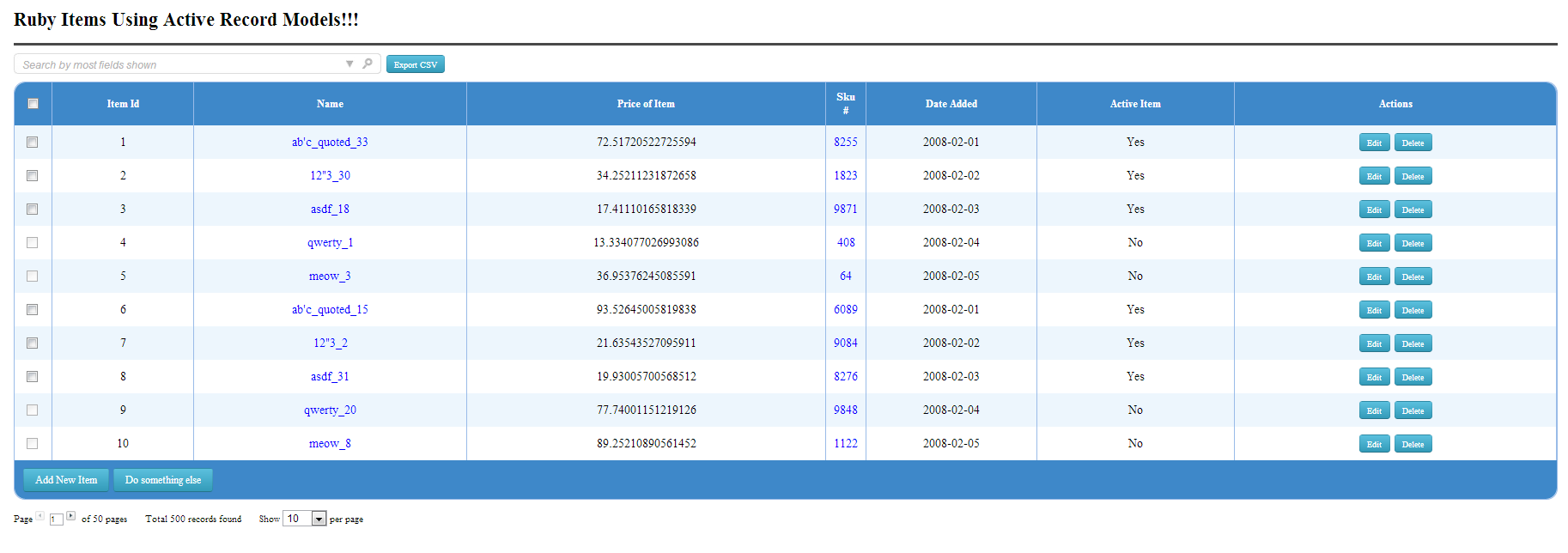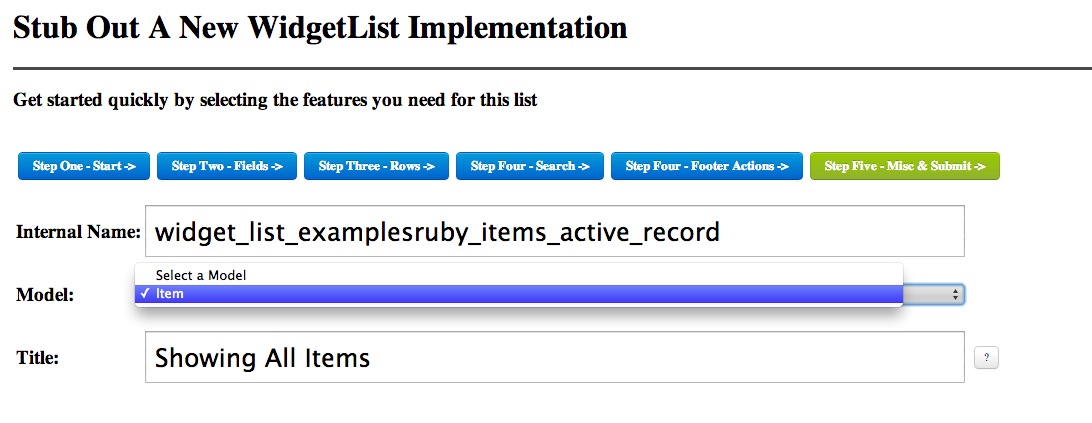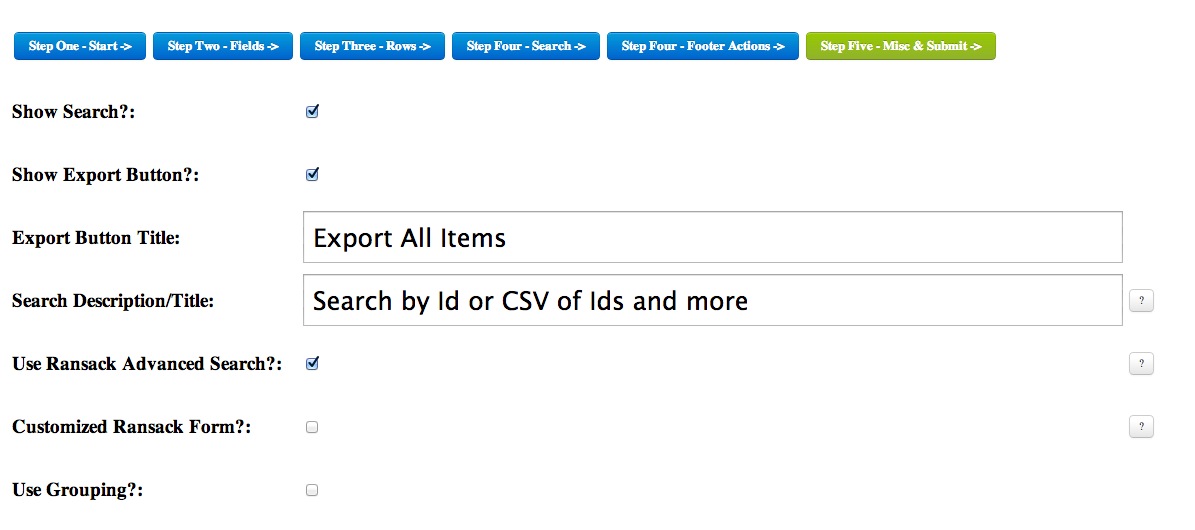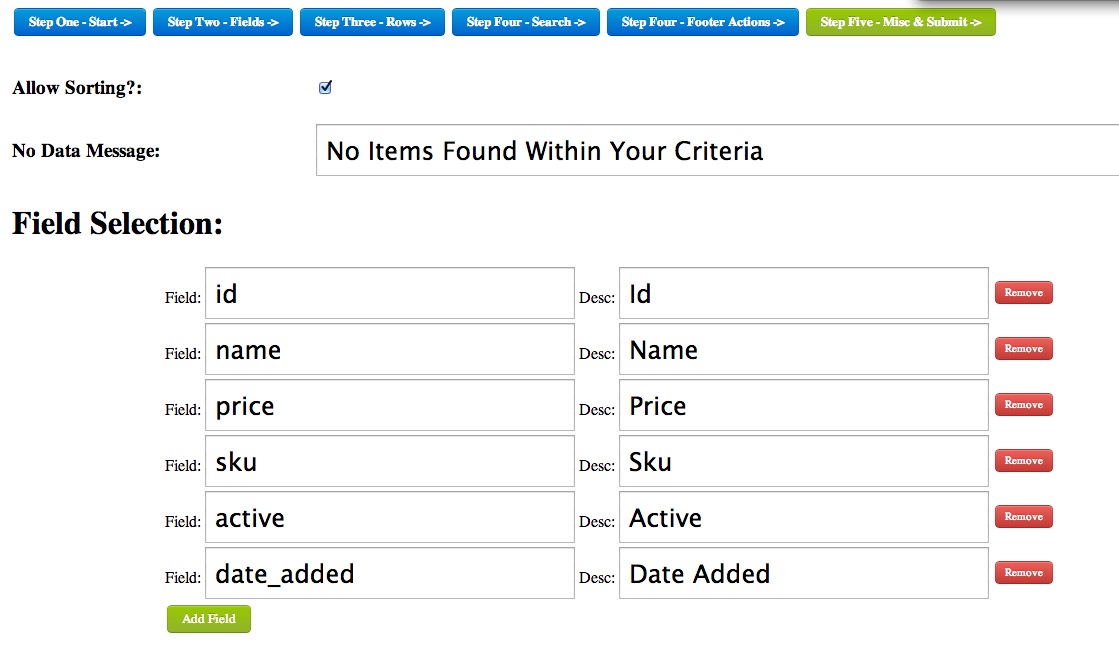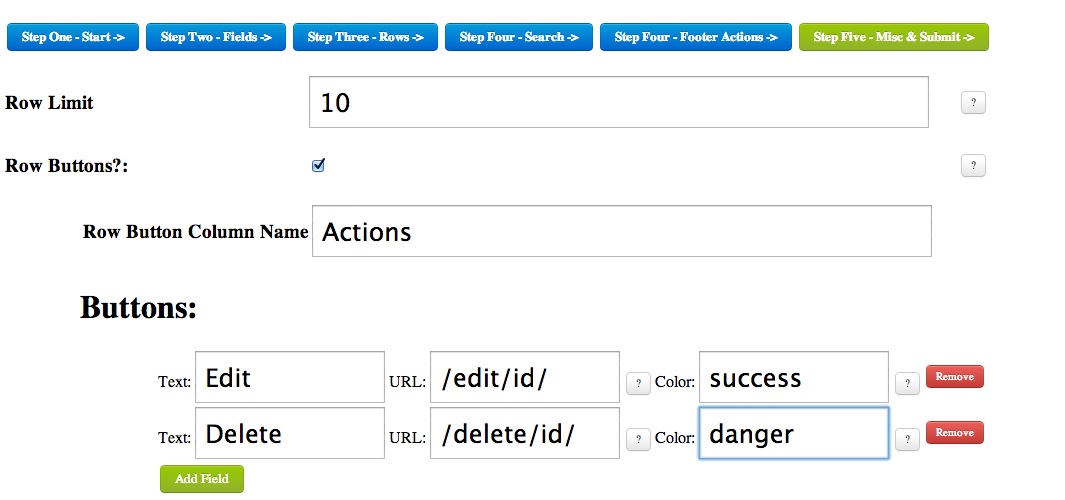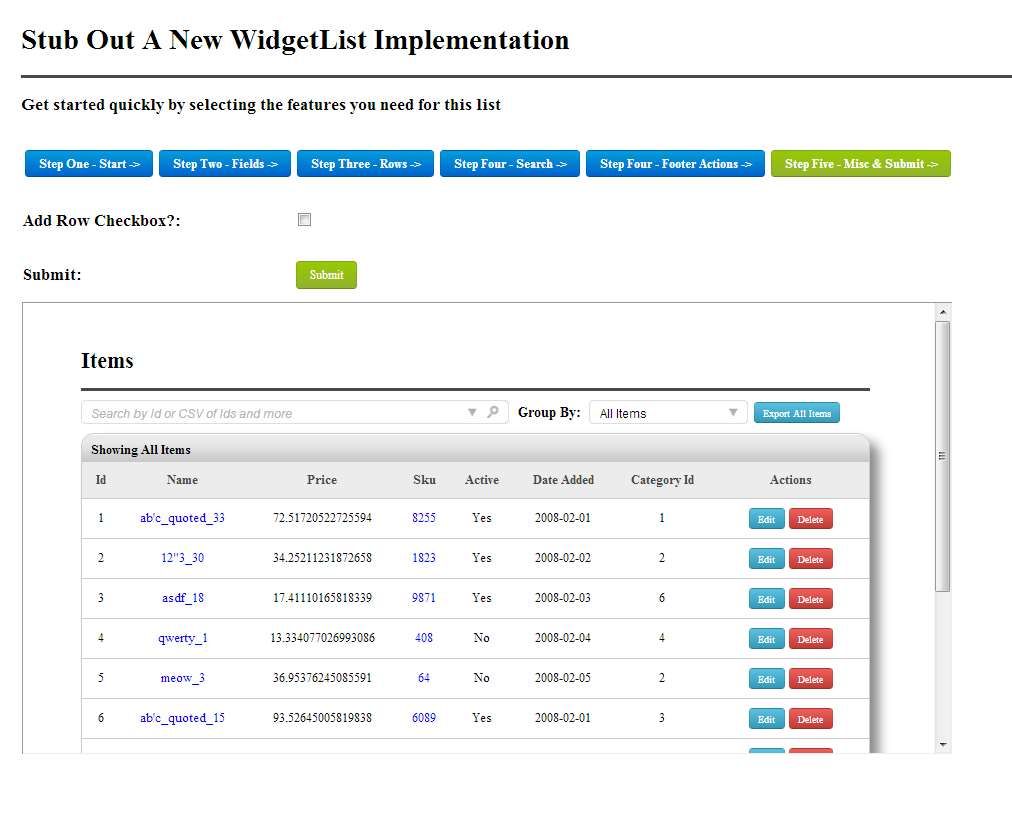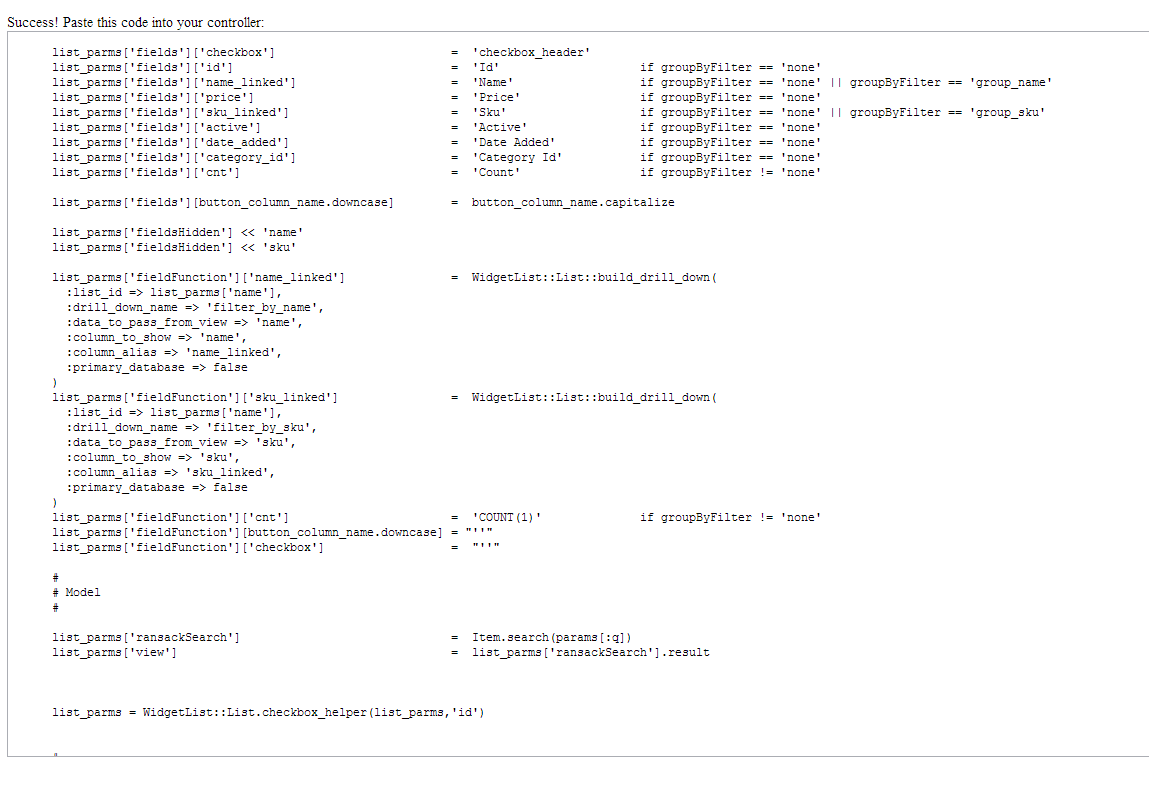====================
https://www.youtube.com/watch?v=A6mZa8Ge2Rk
https://docs.google.com/presentation/d/1gnybf8f7afRM8w5UjTMoV82-0S5HftPewn4pAuIybk8/edit?usp=sharing
This is my first gem ever! It is an exciting gem because it is being used in production by a fortune 500 company. Please use and give me feedback/issues/pull requests.
I feel like there are not very good lists in ruby/rails and/or dont care to find any because nothing will compare to widget_list's implementation.
In rails you have will_paginate and other ones like it using the ActiveRecord approach, but widget_list adds some awesome treats to standard boring pagers:
- A sleek ajaxified list
- Full Blown configuration administration tool
- Supports *ALL Databases (Haven't tested everything yet though, I am sure there are tweaks for each DB). mysql, postgres, oracle and sqllite tested (basic example)
- Full sorting ASC/DESC and paging/limits of list via ajax
- Easily add row level buttons for each row
- Custom tags to pass to be replaced by actual data from each column/value
- Automatic wildcard search support as well as CSV numeric parsing of when to perform a LIKE search or an IN statement on the primary keys
- Column mappings and names
- Drill down link helper functions to allow user to click and filter the list by the particular record value
- Checkboxes for each row for custom selection and mass actions
- Session rememberance for each list/view of what was last sorted, which page the person was on, the limit and search filters
- Ability to set a custom HTML arrow which draws a hidden DIV intended for someone to put custom widgets inside of to pass new filters to the list before it executes
- Buttons for each row and areas on the bottom of the grid where you can add "Action buttons"
- Export visible data as CSV
- Grouping/Predefined report filter feature
- Either use a custom advanced searching form you build, or use the ransack dependency to build out a powerful filtering mechanism on the DOWN ARROW form users click. (See screenshots below)
- Granular control over site-wide list parameter defaults using A WidgetList Helper or by simply copying the desired partial from the gem's app/views/widget_list/list_partials into your app/views/widget_list/list_partials and modifying the template for your "site-wide template" and outer list shells ** Support for theme plugins such as The Blue Sky Basin Theme
###Filter Drop Downs:
###Searching a row (with wild card search):
###Searching "name=asdf_18" (With ActiveRecord and Ransack hook):
###Searching "name=asdf_18" and "sku<9000"(With ActiveRecord and Ransack hook):
###Searching "name=asdf_18" and "sku < 9000" and "price > 67" (With ActiveRecord and Ransack hook):
###Theme plugins/gem support (The Blue Sky Basin Theme):
In order to use this tool please paste your @output into your view
<div style="margin:50px;">
<%=raw @output%>
</div>And then add this to a clean controller. If you have code below, please return below the ajax
@output = WidgetList.go!()
return render :inline => @output if params.key?('ajax')Next you will see this interface which will build some starter code for you:
###As you can see below, there is a preview iframe of what you are configuring:
###And finally, the code is output to get you started
Add this line to your application's Gemfile:
gem 'widget_list'And then execute:
$ bundleOr install it yourself as:
$ gem install widget_listYou can either follow the below instructions or take a look at the changes here https://github.com/davidrenne/widget_list_example/commit/e4e8ab54edcf8bc4538b1850ee762c13bc6f5316
I recommend if you use widget_list in production that you use config.consider_all_requests_local = true as errors will be handled but the base lists will still draw.
widget_list features and configurations primarily work by a single large hash passed to the constructor with the features you need for the given request which changes how the list is displayed or filtered.
name - The unique name/id's of all the pieces that make up your widget list default=([*('A'..'Z'),*('0'..'9')]-%w(0 1 I O)).sample(16).join
database - You can pass which DB connection you would like to use for each list. Only two values/db connections are supported ('primary' or 'secondary') default='primary'
title - This adds an H1 title and horizontal rule on top of your list default=''
listDescription - This adds a grey header box. It is useful for describing the main query default=''
pageId - Base path for requests (typically you never need to change this) default=$_SERVER['SCRIPT_NAME'] + $_SERVER['PATH_INFO']
view - A sub-select query to your database (ALWAYS ALIASED) default=''
data - A "sequel" formatted resultset like would be returned from _select() method. Instead of running a SQL query, you can pass an array to populate the list default={}
colClass - Your custom td class for all td's default=''
colAlign - td align attribute for all td's default=''
fields - The visible fields shown in the current list. KEY=column name VALUE= displayed column header default={}
fieldsHidden - The non-visible fields in the current list. Typically used when you wish to search on this column, but the main column is a drilldown or some HTML value that isnt easily searchable. VALUE=column name default=[]
bindVars - bindVars that are passed to _select() sequel extension I wrote. Which will replace "?" in your query with the associated bindVar default=[]
bindVarsLegacy - A Hash whose KEYS ARE CAPITALIZED and whose value is the replacement string. Inside the "view" you would use :MY_KEY as the template to be replaced default={}
links - Turn text based record value into a link. KEY=column name VALUE=hash of link Config. Links should most likely pass ['tags']['field_name'] = 'get_var_name' (would yeild get_var_name=1234 for that field value 1234). You can pass ['tags']['onclick'] if you dont want to call ButtonLinkPost which will redirect to the URL built. If you pass ['onclick']['tags'], each field passed will be passed as a parameter for the function you designate default={}
buttons - Buttons to generate for each row. KEY=column name VALUE=Hash of widget_button attributes default={}
inputs - widget_check is the only one supported so far. (See examples) default={}
filter - << "xxx = 123" would be the syntax to add a new filter array. (See examples) default=[]
groupBy - The column name or CSV of names to group by. (See examples) default=[]
rowStart - Which page the list should start at default=0
rowLimit - How many rows per page? default=10
orderBy - Default order by "column_name DIRECTION" default=''
allowHTML - Strip HTML from view or not default=true
strlength - Strip HTML from view or not default=true
searchClear - Clear the list's search session default=false
searchClearAll - Clear all search session for all lists default=false
showPagination - Show pagination HTML default=true
searchSession - Remember and restore the last search performed default=true
carryOverRequests - will allow you to post custom things from request to all sort/paging URLS for each ajax. Takes an array of GETVARS which will be passed to each request default=['switch_grouping']
customFooter - Add buttons or HTML at bottom area of list inside the grey box default=''
customHeader - Add buttons or HTML at top area of list above all headers (such as TABS to delineate Summary/Details) default=''
ajaxFunctionAll - Custom javascript called asychronously during each click of each event someone interacts with on the list default=''
ajaxFunction - Mostly an internal setting default='ListJumpMin'
showSearch - Show top search bar default=true
searchOnkeyup - Search on key up event default=''
searchOnclick - Search on click event default=''
searchIdCol - By default id column is here because typically if you call your PK's id and are auto-increment and numeric. This can also take in an array of numeric fields so that users can search CSV's of numbers and get back matches default='id'
searchTitle - Set a title for the search input default= 'Search by Id or a list of Ids and more'
searchFieldsIn - White list of fields to include in a alpha-numeric based like '%%' search default={}
searchFieldsOut - Black list of fields to exclude in a alpha-numeric based search default={'id'=>true}
showExport - Allow users to export current list view as CSV default=true
exportButtonTitle - Title of button default='Export CSV'
groupByItems - Custom drop down's created by passing an array of modes. Best suited to group by the data default=[]
groupBySelected - Initially selected grouping - defaults to first in list if not. Please pass the string value of the "groupByItem" default=false
groupByLabel - Label describing select box default='Group By'
groupByClick - Function to call as a custom function for each click on an item default=''
groupByClickDefault - Default group by handler inside widget_list.js default="ListChangeGrouping('<!--NAME-->', this);"
listSearchForm - Allows you to pass a custom form for the ARROW drop down for advanced searching default=''
ransackSearch - If you pass ModelName.search(params[:q]) ransack will show up in your advanced search default=false
cornerRadius - Either int number of pixels for radius corners. Or '14px' or whatever you want. default=15
columnStyle - Column styles. KEY=column name VALUE= the inline style applied default={}
columnClass - Column class. KEY=column name VALUE= the class name default={}
columnPopupTitle - Column title as you hover over. KEY=column name VALUE=Popup text default={}
columnWidth - Column widths. KEY=column name VALUE= '100px' default={}
columnNoSort - Dont allow sorting on these columns (By default all visible columns have a sort link built). KEY=column name VALUE=column name default={}
borderedColumns - Add a right border to each column. default=false
borderedRows - Style the border of each row. default=false
borderRowStyle - Border style of each row. default='1px solid #CCCCCC'
borderHeadFoot - Style the border of header (bottom) and footer (top). default=false
headFootBorderStyle - Border style of header (bottom) and footer (top). default='1px solid #CCCCCC'
borderColumnStyle - Style of row if you use this above feature. default='1px solid #CCCCCC'
bordersEverywhere? - If true, use borderEverywhere for all four borders you can pass separately default=false
borderEverywhere - The catch all style of borders for headers, rows, outer table border and columns. default='1px solid #CCCCCC'
defaultButtonClass - As you have seen in many screenshots, there are several buttons. This controls the innerClass of those drawn from the list. See lib/widget_list/widgets.rb default='info'
useBoxShadow - Show shadow or not on list default=true
shadowInset - Number or string with '11Px' for an 11PX Inset default=10
shadowSpread - Number or string with '11Px' for an 11PX spread default=20
shadowColor - Color of bottom right shadow default='shadowColor'
rowClass - Class added to all rows default=''
rowFontColor - Font color of all data rows that dont have a rowStylesByStatus color: passed to it default='black'
rowColorByStatus - {'rowColorByStatus' =>
{'active'=>
{'No' => '#EBEBEB' }
}
}
Color a row based on the value of the column.
default={}
rowStylesByStatus - {'rowStylesByStatus' =>
{'active'=>
{'No' => 'font-style:italic;color:red;' }
}
}
Style a row based on the value of the column.
default={}
rowOffsets - Color for each row and offset default=['FFFFFF','FFFFFF']
noDataMessage - Message to show when no data is found default='Currently no data.'
useSort - Allow sorting on list default=true
headerClass - Class of each individual header column default={}
fieldFunction - A way to wrap or inject columns or SQL formatting in place of your columns default={}
template - Pass in a custom template for outer shell default=''
templateFilter - Instead of widget list building your search box. Pass your own HTML default=''
storeSessionChecks - See http://stackoverflow.com/questions/1928204/marshal-data-too-short for configuring larger session storage which checkboxes would eat up if you had this set to true default=false
totalRow - Add in your numeric or dollar amount fields you want to sum or average for the bottom record list_parms['totalRow']['my_field'] = true default={}
totalRowFirstCol - A string to display what the row is showing default='<strong>Total:</strong>'
totalRowMethod - Allows you to pass 'average' to define which columns should average the sum list_parms['totalRowPrefix']['my_field'] = 'average'. There is only support for average right now default={}
totalRowPrefix - The prefix will be automatically generated based off the value such as $ for a dollar amount would be injected without this configuration. But this allows you to pass whatever you want displayed for the bottom summary row list_parms['totalRowPrefix']['my_field'] = true default={}
totalRowSuffix - The suffix will be automatically generated based off the value at the end of the last row. But this allows you to pass whatever you want displayed for the bottom summary row list_parms['totalRowSuffix']['my_field'] = true default={}
totalRowSeparator - Your decimal for the formatted number (if any is shown) default='.'
totalRowDelimiter - Your "comma" for the formatted number (if any is shown) default=','
totalRowDefault - For any columns such as strings which cannot be summed or added into a summary this value will be the place holder for that TD. default='N/A'
columnHooks - Todo default={}
rowHooks - Todo default={}
Change application.css to:
*= require widget_list
*= require widgetsChange application.js to:
//= require widget_listCompile the new assets:
rake assets:precompile
#2 - Run bundle exec rails s to have widget_list create config/widget-list.yml which will point to your active record database.yml
Configure your connection settings for your primary or secondary widget_list connections.
http://sequel.rubyforge.org/rdoc/files/doc/opening_databases_rdoc.html
rails generate controller WidgetListExamples ruby_items
Then modify app/views/widget_list_examples/ruby_items.html.erb and add
<div style="margin:50px;">
<%=raw @output%>
</div>Add config/routes.rb if it is not in there:
match ':controller(/:action)'Ensure that sessions are loaded into active record because widget_list keeps track of several settings on each list for each session
config.session_store :active_record_storeAdd the example shown below to app/controllers/widget_list_examples_controller.rb#ruby_items
Go To http://localhost:3000/widget_list_examples/ruby_items
#
# Load Sample "items" Data. Comment out in your first time executing a widgetlist to create the items table
#
=begin
begin
WidgetList::List.get_sequel.create_table :items do
primary_key :id
String :name
Float :price
Fixnum :sku
String :active
Date :date_added
end
items = WidgetList::List.get_sequel[:items]
100.times {
items.insert(:name => 'ab\'c_quoted_' + rand(35).to_s, :price => rand * 100, :date_added => '2008-02-01', :sku => rand(9999), :active => 'Yes')
items.insert(:name => '12"3_' + rand(35).to_s, :price => rand * 100, :date_added => '2008-02-02', :sku => rand(9999), :active => 'Yes')
items.insert(:name => 'asdf_' + rand(35).to_s, :price => rand * 100, :date_added => '2008-02-03', :sku => rand(9999), :active => 'Yes')
items.insert(:name => 'qwerty_' + rand(35).to_s, :price => rand * 100, :date_added => '2008-02-04', :sku => rand(9999), :active => 'No')
items.insert(:name => 'meow_' + rand(35).to_s, :price => rand * 100, :date_added => '2008-02-05', :sku => rand(9999), :active => 'No')
}
rescue Exception => e
#
# Table already exists
#
logger.info "Test table in items already exists? " + e.to_s
end
=end
begin
list_parms = WidgetList::List::init_config()
#
# Give it a name, some SQL to feed widget_list and set a noDataMessage
#
list_parms['name'] = 'ruby_items_yum'
#
# Handle Dynamic Filters
#
groupBy = WidgetList::List::get_group_by_selection(list_parms)
case groupBy
when 'Item Name'
groupByFilter = 'item'
countSQL = 'COUNT(1) as cnt,'
groupBySQL = 'GROUP BY name'
groupByDesc = ' (Grouped By Name)'
when 'Sku Number'
groupByFilter = 'sku'
countSQL = 'COUNT(1) as cnt,'
groupBySQL = 'GROUP BY sku'
groupByDesc = ' (Grouped By Sku Number)'
else
groupByFilter = 'none'
countSQL = ''
groupBySQL = ''
groupByDesc = ''
end
list_parms['filter'] = []
list_parms['bindVars'] = []
drillDown, filterValue = WidgetList::List::get_filter_and_drilldown(list_parms['name'])
case drillDown
when 'filter_by_name'
list_parms['filter'] << " name = ? "
list_parms['bindVars'] << filterValue
list_parms['listDescription'] = WidgetList::List::drill_down_back(list_parms['name']) + ' Filtered by Name (' + filterValue + ')' + groupByDesc
when 'filter_by_sku'
list_parms['filter'] << " sku = ? "
list_parms['bindVars'] << filterValue
list_parms['listDescription'] = WidgetList::List::drill_down_back(list_parms['name']) + ' Filtered by SKU (' + filterValue + ')' + groupByDesc
else
list_parms['listDescription'] = ''
list_parms['listDescription'] = WidgetList::List::drill_down_back(list_parms['name']) if !groupByDesc.empty?
list_parms['listDescription'] += 'Showing All Ruby Items' + groupByDesc
end
# put <%= @output %> inside your view for initial load nothing to do here other than any custom concatenation of multiple lists
#
# Setup your first widget_list
#
button_column_name = 'actions'
#
# customFooter will add buttons to the bottom of the list.
#
list_parms['customFooter'] = WidgetList::Widgets::widget_button('Add New Item', {'page' => '/add/'} ) + WidgetList::Widgets::widget_button('Do something else', {'page' => '/else/'} )
#
# Give some SQL to feed widget_list and set a noDataMessage
#
list_parms['searchIdCol'] = ['id','sku']
#
# Because sku_linked column is being used and the raw SKU is hidden, we need to make this available for searching via fields_hidden
#
list_parms['fieldsHidden'] = ['sku']
drill_downs = []
drill_downs << WidgetList::List::build_drill_down( :list_id => list_parms['name'],
:drill_down_name => 'filter_by_name',
:data_to_pass_from_view => 'a.name',
:column_to_show => 'a.name',
:column_alias => 'name_linked'
)
drill_downs << WidgetList::List::build_drill_down(
:list_id => list_parms['name'],
:drill_down_name => 'filter_by_sku',
:data_to_pass_from_view => 'a.sku',
:column_to_show => 'a.sku',
:column_alias => 'sku_linked'
)
list_parms['view'] = '(
SELECT
' + countSQL + '
' + drill_downs.join(' , ') + ',
\'\' AS checkbox,
a.id AS id,
a.active AS active,
a.name AS name,
a.sku AS sku,
a.price AS price,
a.date_added AS date_added
FROM
items a
' + groupBySQL + '
) a'
#
# Map out the visible fields
#
list_parms['fields'] = {}
list_parms['fields']['checkbox'] = 'checkbox_header'
list_parms['fields']['cnt'] = 'Total Items In Group' if groupByFilter != 'none'
list_parms['fields']['id'] = 'Item Id' if groupByFilter == 'none'
list_parms['fields']['name_linked'] = 'Name' if groupByFilter == 'none' or groupByFilter == 'item'
list_parms['fields']['price'] = 'Price of Item' if groupByFilter == 'none'
list_parms['fields']['sku_linked'] = 'Sku #' if groupByFilter == 'none' or groupByFilter == 'sku'
list_parms['fields']['date_added'] = 'Date Added' if groupByFilter == 'none'
list_parms['fields']['active'] = 'Active Item' if groupByFilter == 'none'
list_parms['fields'][button_column_name] = button_column_name.capitalize if groupByFilter == 'none'
list_parms['noDataMessage'] = 'No Ruby Items Found'
list_parms['title'] = 'Ruby Items Using Sequel!!!'
#
# Create small button array and pass to the buttons key
#
mini_buttons = {}
mini_buttons['button_edit'] = {'page' => '/edit',
'text' => 'Edit',
'function' => 'Redirect',
#pass tags to pull from each column when building the URL
'tags' => {'my_key_name' => 'name','value_from_database'=>'price'}}
mini_buttons['button_delete'] = {'page' => '/delete',
'text' => 'Delete',
'function' => 'alert',
'innerClass' => 'danger'}
list_parms['buttons'] = {button_column_name => mini_buttons}
list_parms['fieldFunction'] = {
button_column_name => "''",
'date_added' => ['postgres','oracle'].include?(WidgetList::List::get_db_type) ? "TO_CHAR(date_added, 'MM/DD/YYYY')" : "date_added"
}
list_parms['groupByItems'] = ['All Records', 'Item Name', 'Sku Number']
#
# Setup a custom field for checkboxes stored into the session and reloaded when refresh occurs
#
list_parms = WidgetList::List.checkbox_helper(list_parms,'id')
#
# Generate a template for the DOWN ARROW for CUSTOM FILTER
#
input = {}
input['id'] = 'comments'
input['name'] = 'comments'
input['width'] = '170'
input['max_length'] = '500'
input['input_class'] = 'info-input'
input['title'] = 'Optional CSV list'
button_search = {}
button_search['onclick'] = "alert('This would search, but is not coded. That is for you to do')"
list_parms['listSearchForm'] = WidgetList::Utils::fill( {
'<!--BUTTON_SEARCH-->' => WidgetList::Widgets::widget_button('Search', button_search),
'<!--COMMENTS-->' => WidgetList::Widgets::widget_input(input),
'<!--BUTTON_CLOSE-->' => "HideAdvancedSearch(this)" } ,
'
<div id="advanced-search-container">
<div class="widget-search-drilldown-close" onclick="<!--BUTTON_CLOSE-->">X</div>
<ul class="advanced-search-container-inline" id="search_columns">
<li>
<div>Search Comments</div>
<!--COMMENTS-->
</li>
</ul>
<br/>
<div style="text-align:right;width:100%;height:30px;" class="advanced-search-container-buttons"><!--BUTTON_RESET--><!--BUTTON_SEARCH--></div>
</div>'
# or to keep HTML out of controller render_to_string(:partial => 'partials/form_xxx')
)
#
# Control widths of special fields
#
list_parms['columnWidth'] = {
'date_added'=>'200px',
'sku_linked'=>'20px',
}
#
# If certain statuses of records are shown, visualize
#
list_parms.deep_merge!({'rowStylesByStatus' =>
{'active'=>
{'Yes' => '' }
}
})
list_parms.deep_merge!({'rowStylesByStatus' =>
{'active'=>
{'No' => 'font-style:italic;color:red;' }
}
})
list_parms.deep_merge!({'rowColorByStatus' =>
{'active'=>
{'Yes' => '' }
}
})
list_parms.deep_merge!({'rowColorByStatus' =>
{'active'=>
{'No' => '#EBEBEB' }
}
})
list_parms['columnPopupTitle'] = {}
list_parms['columnPopupTitle']['checkbox'] = 'Select any record'
list_parms['columnPopupTitle']['cnt'] = 'Total Count'
list_parms['columnPopupTitle']['id'] = 'The primary key of the item'
list_parms['columnPopupTitle']['name_linked'] = 'Name (Click to drill down)'
list_parms['columnPopupTitle']['price'] = 'Price of item (not formatted)'
list_parms['columnPopupTitle']['sku_linked'] = 'Sku # (Click to drill down)'
list_parms['columnPopupTitle']['date_added'] = 'The date the item was added to the database'
list_parms['columnPopupTitle']['active'] = 'Is the item active?'
output_type, output = WidgetList::List.build_list(list_parms)
case output_type
when 'html'
# put <%= @output %> inside your view for initial load nothing to do here other than any custom concatenation of multiple lists
@output = output
when 'json'
return render :inline => output
when 'export'
send_data(output, :filename => list_parms['name'] + '.csv')
return
end
rescue Exception => e
Rails.logger.info e.to_s + "\n\n" + $!.backtrace.join("\n\n")
#really this block is just to catch initial ruby errors in setting up your list_parms
#I suggest taking out this rescue when going to production
output_type, output = WidgetList::List.build_list(list_parms)
case output_type
when 'html'
@output = output
when 'json'
return render :inline => output
when 'export'
send_data(output, :filename => list_parms['name'] + '.csv')
return
end
end- Fork it
- Create your feature branch (
git checkout -b my-new-feature) - Commit your changes (
git commit -am 'Add some feature') - Push to the branch (
git push origin my-new-feature) - Create new Pull Request
David Renne :: david_renne @ ya hoo - .com :: @phpnerd
Copyright 2012 David Renne
Licensed under the Apache License, Version 2.0 (the "License"); you may not use this file except in compliance with the License. You may obtain a copy of the License at
http://www.apache.org/licenses/LICENSE-2.0
Unless required by applicable law or agreed to in writing, software distributed under the License is distributed on an "AS IS" BASIS, WITHOUT WARRANTIES OR CONDITIONS OF ANY KIND, either express or implied. See the License for the specific language governing permissions and limitations under the License.

